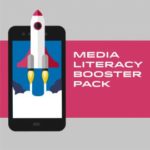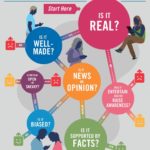A free press is essential to the success of a democracy. As the media has evolved over time to include radio, television, internet and now smart phones and social media apps, the ability in “being capable to read them” needs examining. This lesson guides students through analysis of social media posts, the definition of terms relevant to the media, and provides tools for identifying quality sources for examination of current political issues. This lesson accompanies the Talking Turkey: Taking the ‘Dis’ Out of Civil Discourse program as well as YLI and American Evolution’s First Freedom Wall. Free registration is required to access the lesson plan.
What Is ‘Fake News’ And How Does It Impact Our Lives?
This deliberation will have students view short video clips and news articles to analyze the effect of fake news on traditional media outlets, the reasons and incentives for purveyors of “fake news,” and provide students with resources to strengthen their media literacy skills. Students will use this information to develop strategies to identify “fake news” and improve their news literacy.
Bell Ringer: Social Media and Democracy
Students learn about the effects of social media on society including the impact on civic engagement and social disintegration.
Media Literacy Booster Pack
The Media and Partisanship
Decoding the News: Building Savvy Media Consumers
Objective: This lesson will promote understanding about what it means to be “news literate” and how learning to analyze media reports about current events can foster civic engagement.
Fact Finder: Your Foolproof Guide to Media Literacy
Are your students savvy searchers? Can they spot the difference between a straight news article and an opinion piece? Do they recognize bias in their sources … or in themselves?
Tackle these challenges and more using Fact Finder’s 11 flexible, multimedia lesson plans. Eight skill-building lesson plans introduce essential media literacy concepts through engaging explainer videos and colorful infographics that help students revisit, retain and apply the key concepts. The accompanying News or Noise? Media Map provides a collection of examples ready for students to analyze and evaluate with the support of worksheets and discussion prompts. Three reporting lesson plans help students take what they’ve learned and apply it to their own content creation, inspired by the issues that matter to them.



